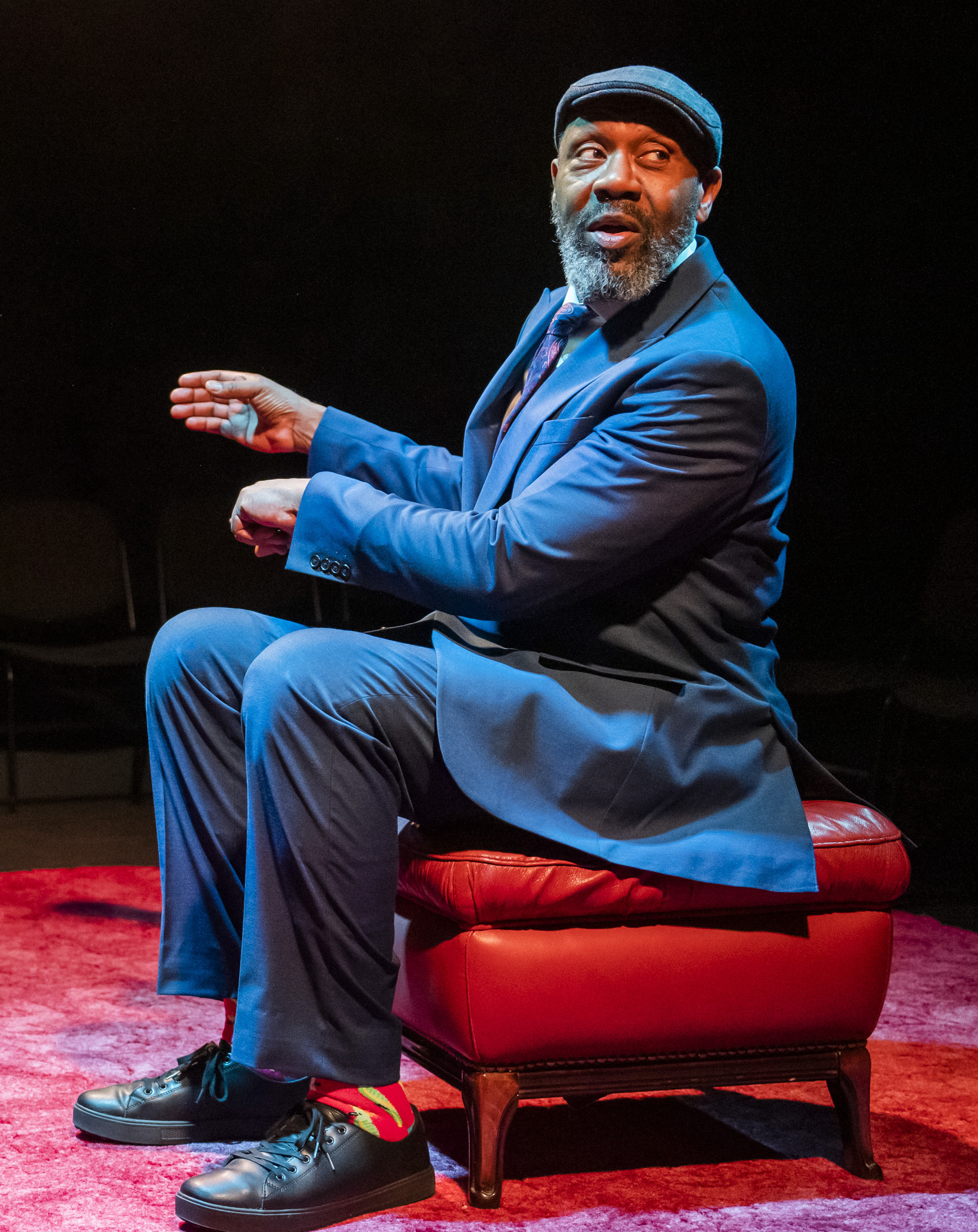Reggae hits are already playing over the speaker system at the Bush when the audience enters, some jigging to the sounds as they find their seats. The set before us is a living room with a bright orange carpet, a squidgy tan faux leather armchair and a cocktail trolley.
The party atmosphere continues when August Henderson comes on, aka a trim and grinning Lenny Henry in a suit, collar and tie and soft tweed cap. And there’s more jollity as August starts handing out tots of rum from his little cocktails trolley and swings into the terrain that made Henry’s name in the early days of his career, fashioning comic characters out of the West Indian/West Bromwich community he grew up in.
August is not the same as Lenny, though. Lenny was born in Dudley, Worcs, but August, he tells us, didn’t arrive in the UK until he was eight, in 1962. He and his mother Tallulah flew into London from Jamaica intent on finding Hubert, the poppa who had gone on ahead to find work but then somehow forgot to say he wanted them to join him. They arrived with great hope, but found only humiliation. Tallulah, though, was a fighter; she moved them to the West Midlands to find work and other Black people to talk to.
Henry is terrific company in this kind of material, a master of controlling a room at his own pace. He has a ball incarnating all the characters from August’s life: his wizened grandma and stern mother; his schoolmates, with whom he forms a terrible ska band, Black Fist; August’s Asian business partner, Iqbal; Roisin, the Irish woman he likes to dance with at the club he and Iqbal open behind their fruit-and-veg shop. HIs accents are spot-on, his exuberant body language huge fun to watch, especially in the slow wind dance August loves.
 He throws just enough quips into the script to keep the laughs coming, even though racism and hardship are part of the scenario. The National Front and the skinheads bewilder him, he says, because they adopted Black fashions and music, but then decided they hated actual Blacks. Henry really makes the line land and underlines the idiocy of the skinhead stance. Later on he gives August a line about not wanting to get married as he would be “as miserable as Nigel Farage at the Notting Hill Carnival” that almost brought the house down. There’s a particularly hilarious burial scene, too – his mother’s – where he clowns around as the Jamaican gravediggers, with full gestures and patois.
He throws just enough quips into the script to keep the laughs coming, even though racism and hardship are part of the scenario. The National Front and the skinheads bewilder him, he says, because they adopted Black fashions and music, but then decided they hated actual Blacks. Henry really makes the line land and underlines the idiocy of the skinhead stance. Later on he gives August a line about not wanting to get married as he would be “as miserable as Nigel Farage at the Notting Hill Carnival” that almost brought the house down. There’s a particularly hilarious burial scene, too – his mother’s – where he clowns around as the Jamaican gravediggers, with full gestures and patois.
A couple of times there’s a sudden buzzing and the wall behind him briefly flashes up the projected black and white image of a man in a white shirt sitting alone, with the date and "Camera 1” at the top: a secruity camera. August momentarily flinches but ignores it. The story of his life rolls amiably on: his children arrive, leave home, marry. He suffers a bereavement, finds love, proposes marriage.
If, after an hour, you were wondering where Henry was going to take this knockabout narrative, entertaining though it is, you will probably grasp its destination when August announces he is going to assemble all the documentation for his wedding – or his highly competent teacher daughter Louise will, anyway. Suddenly clouds start appearing over this happy-go-lucky but mainly honourable chatty man we have spent more than an hour getting to know and like. The first of many ominous brown envelopes arrives, which he ignores. He is sleepwalking into a nightmare without knowing it, and it’s wrenching to watch.
The publicity material calls this a play about the Windrush scandal, though the name is never uttered. It's the story of a life, and the simplicity of this approach is its greatest weapon. Be prepared to have your heart broken by the callousness of the outsourced Home Office machine under Theresa May. It’s a fine achievement from Henry, whose range is ever-expanding, and a credit to the Bush, whose director, Lynette Linton, codirects with Daniel Bailey.















Add comment